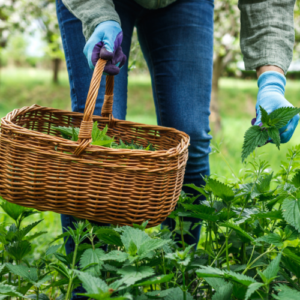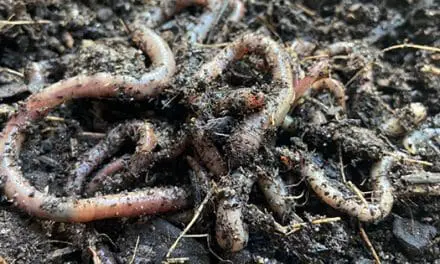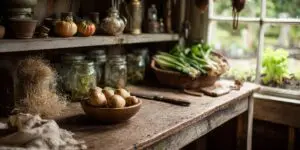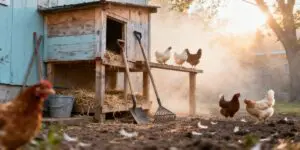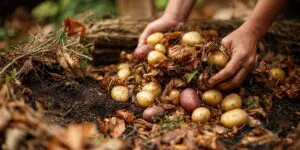Stinging nettles are everywhere in your garden, and I’m not gonna lie; we often overlook them and have them discarded. No need to do this anymore! In this guide, I will reveal how feeding nettles to my chickens changed their lives. Keep on reading to get all the details.
What Are Stinging Nettles?
Even noticed leaves having these tiny hair appearing that seem to sting at the slightest touch? Yes, these are nettles scattered almost in every corner of our lawn.
Most of the time, you might think of them as weeds and would often get rid of them just when you spot them. Even I used to do this until my grandmother shared how beneficial they can be, especially for poultry.
But not every plant you come across can be identified as a nettle. Some distinguishing features of this herb are:
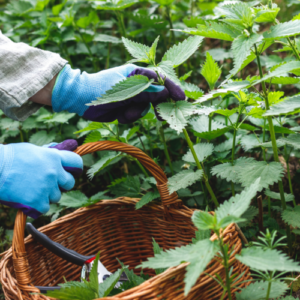
- Leaves: When you closely observe nettle’s leaves, you’ll notice they have serrated edges, usually growing in pairs. These usually have this dark green color with a pointed tip and stinging hairs all over the surface that release histamine when touched.
- Stems: The stem part is also covered in stinging hairs and appears most of the time in a square shape, just like mint.
- Habitat: Nettles love to thrive in moist as well as nitrogen-rich soil. You can usually spot them in gardens along fence lines with partial shade and full sun.
Nutritional Value of Stinging Nettles
Stinging nettles are rich in nutrients like:
- Vitamins: It has a good proportion of vitamins like A, C, K, and B, which help support healthy feathers and a strong immune system.
- Minerals: Stinging nettles also have a good amount of calcium, iron, phosphorus, zinc, and potassium, which are necessary for strong bone health, eggshells, and energy levels.
- Protein and Fiber: Each stinging nettle leaf contains a generous amount of protein and fiber, making it the best supplement for molting.
Related: Duck Eggs Vs. Chicken Eggs
Can You Feed Stinging Nettles to Your Chickens?
Yes, chickens can actually eat stinging nettles, and it is actually great for them. When they are in their young phase, nettles are tender and less bitter, so chicks may even nibble on them freely. However, often the plant’s natural stingy nature can make it appear less appealing to your flock.
No need to worry, as you can still have your chickens enjoy nettles in appetizing and, of course, safe ways like these:
Adding to Chicken’s Dry Feed
One of the easiest ways to incorporate nettles into your chickens’ diet is by mixing them with their usual feed. You can start with:
- Dry the nettles you have harvested. You can do so by placing the leaves in the sun on a clean surface or using a dehydrator at low-heat temperature.
- Once the nettles are dried, grind them into fine powder using a grinder.
- Now, combine this powder with your chickens’ feed along with pellets or other grains. Store the rest of the mix in an airtight container for future use.
Sometimes I’ll mix in other herbs along with the nettles, like yarrow, chicory or calendula. They all dry and grind up just as easily, and they each offer their own little boost. Yarrow helps with circulation, chicory’s great for digestion, and calendula is like a gentle tonic for their insides and skin. Mixed together, it makes a kind of herbal superfeed that my hens seem to love, and I swear their feathers get glossier every time I do it.
I actually started growing most of these after getting my hands on this Medicinal Garden Kit that came with the seeds and a guide explaining how to use each plant. It was a simple way to get everything started in one go, and now I’ve got my own little backyard apothecary, good for the flock and for me.
Giving in Mashed Form
Nettles can also be fed to your chickens in mashed form. You just have to follow the below steps for this blend:
- Step 1: Gather a few leaves of nettle, but in their young form.
- Step 2: Have those freshly harvested baby nettle leaves boil in a container for at least 15 minutes. Doing so will neutralize the sting and have the herb release its nutrients.
 Step 3: When the leaves are soft, turn off the gas and have the mixture cool down.
Step 3: When the leaves are soft, turn off the gas and have the mixture cool down.- Step 4: Lastly, have this cooked nettle leaves mixture blended with oats, rice or scrambled eggs and feed a hearty treat to your chickens.
Feeding in Liquid Form
If you own a coop that is full of picky eaters, even then you can feed them stinging nettles without them knowing. You can mix the powdered form of it in their drinking water and have your chickens drink it. Or you can also prepare nettle leaves tea by following the below steps:
- Pluck leaves of nettle and have them boil in water for a good 10-15 minutes.
- Turn off the gas and let the tea cool down in the open air.
- Now, strain the tea using a strainer and keep it in a container beside your chicken’s drinking water.
Related: Do This For Your Chickens So They Lay More Eggs
What Did Feeding Stinging Nettles Do to My Chickens?
Just when I started feeding nettles to my chickens, I started noticing incredible results such as:
- An instant improvement in egg production and overall growth of the flock.
- The coop’s immune system got enhanced, and now they weren’t falling sick every now and then.
- Nettles worked as a natural dewormer and eliminated internal as well as external parasites without the use of any chemicals.
But whenever my chickens do get sick, which of course still happens from time to time, I give them this remedy I learned from a book on Amish living. It’s got a whole section on natural livestock care, and one of the things they recommend is a simple herbal tonic. I mixed it up using my own plants from the garden, and honestly, it’s worked every time.
🧪 What Happens When You Start Using Nettles
If you think stinging nettles are just for chickens… you’re making the same mistake I did.
This wild-growing plant is insanely powerful for humans too, especially if you’re dealing with inflammation, poor circulation, brittle hair, tiredness, dull skin, or hormonal swings.
Nettles are packed with iron, silica, vitamins A, C, K… basically everything your body is begging for in times of stress or imbalance. They’re also one of the few natural ways to clean out your lymphatic system and stop toxic buildup before it becomes a real problem.
Yes, you can make your own tincture. You can throw nettles into food or brew a tea. But let’s be honest…
- Picking them hurts like hell, if you’ve ever grabbed a nettle without gloves, you know it’s no joke
- Even dried nettles from herbal stores might be loaded with pesticides or grown in contaminated soil
- Most people don’t even use the right part of the plant or harvest at the right time, meaning they lose all the medicinal potency and are left with bitter, useless water
And even if you get all that right…you still need time, knowledge, and a clean source.
That’s why I take the shortcut: 20-30 drops of concentrated Stinging Nettle Tincture, made from clean, wild-grown plants by someone who knows exactly what they’re doing.
👉 Click here to try the same tincture I use, and feel what real herbal power can do when it’s done right.
I wish someone had told me about this years ago… because the longer you wait, the longer your body keeps suffering. Don’t let this “weed” fool you — it’s a medicine cabinet all by itself.
Things to Take Care of While Feeding Nettles to Your Chickens
While nettles can be a total game-changer for your flock’s health, there are a few important precautions to keep in mind before feeding them. This might include:
Wearing Gloves Before Plucking Them
Stinging nettles, as the name implies, can sting entirely if you harvest them with your bare hands. Whether you feed them raw or cooked, they will still tingle your skin. To spare the hassle, simply wear gloves when working with nettles. And don’t pull them out until you’ve fed the mix to your chickens.
Never Feed Raw Nettles to Chickens
Even though many gardeners might advise you to feed raw nettles to your chickens, still try to avoid doing so. In its purest form, nettle leaves can sting the mouth and digestive system of your chickens. To keep them from suffering, always serve them the herb either in fine powder form or after boiling them.
Avoid Feeding It Too Much
Do not feed nettles in excess to your flock, as too much of it can upset or overwhelm their digestive system. Ensure you are feeding them the herb just as a supplement and not a primary feed.
Observe Closely for Side Effects
When you introduce nettles to your chicken feed, do it gradually. Begin with small amounts and observe how your chickens adjust to know that they will be okay with it. But if they indicate that they hate it, you might attempt to mix the nettles with something or attempt another way of giving it to them.
Final Words
To sum it up, when you have stinging nettles on your homestead, you never have to worry about your coop falling sick. The herb has plenty of nutrients to keep your flock healthy, thriving, and active.
No matter how beneficial nettles are, they must be handled carefully. Be sure to use the precautions mentioned here, and you’ll be all ready to feed your chickens with a potent nutritional combo right from your garden. Happy farming!
You may also like:
Stop Throwing Away Your Weeds, Do This Instead!
The Only Plant That Will Make Your Poultry Lay More Eggs Than Usual (Video)
Automatic Chicken Feeder That Needs No Electricity: How Do You Make It?
Homemade Chicken Feed Recipes: How to Make Feed That Keeps Your Hens Healthy
Never Feed THIS to Your Chickens


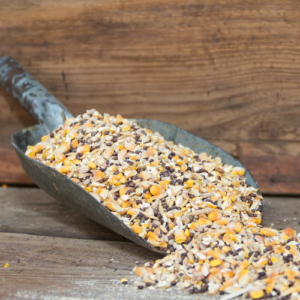
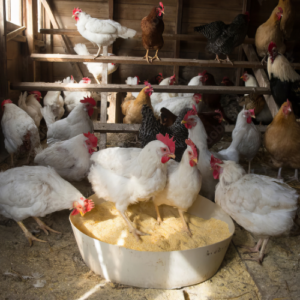 Step 3: When the leaves are soft, turn off the gas and have the mixture cool down.
Step 3: When the leaves are soft, turn off the gas and have the mixture cool down.